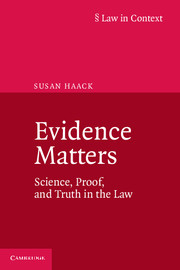Book contents
- Frontmatter
- Epigraph
- Contents
- Acknowledgments
- Introduction: A Pragmatist Perspective on Science, Proof, and Truth in the Law
- 1 Epistemology and the Law of Evidence
- 2 Epistemology Legalized
- 3 Legal Probabilism
- 4 Irreconcilable Differences? The Troubled Marriage of Science and Law
- 5 Trial and Error
- 6 Federal Philosophy of Science
- 7 Peer Review and Publication
- 8 What’s Wrong with Litigation-Driven Science?
- 9 Proving Causation
- 10 Correlation and Causation
- 11 Risky Business
- 12 Nothing Fancy
- Cases Cited
- Statutes, etc., Cited
- Bibliography
- Glossary
- Index
2 - Epistemology Legalized
Or, Truth, Justice, and the American Way
Published online by Cambridge University Press: 05 August 2014
- Frontmatter
- Epigraph
- Contents
- Acknowledgments
- Introduction: A Pragmatist Perspective on Science, Proof, and Truth in the Law
- 1 Epistemology and the Law of Evidence
- 2 Epistemology Legalized
- 3 Legal Probabilism
- 4 Irreconcilable Differences? The Troubled Marriage of Science and Law
- 5 Trial and Error
- 6 Federal Philosophy of Science
- 7 Peer Review and Publication
- 8 What’s Wrong with Litigation-Driven Science?
- 9 Proving Causation
- 10 Correlation and Causation
- 11 Risky Business
- 12 Nothing Fancy
- Cases Cited
- Statutes, etc., Cited
- Bibliography
- Glossary
- Index
Summary
[T]he man of mere theory is in the practical sphere an useless and dangerous pedant.
–F. H. BradleyTRUTH AND JUSTICE
The invitation to give the Olin Lecture in Jurisprudence at Notre Dame was quite unexpected: but perhaps I shouldn’t have been too surprised to find myself called upon to play the role of jurisprude. I did, after all, once publish an essay entitled “Confessions of an Old-Fashioned Prig”–an essay in which I tried to articulate why it matters whether you care about the truth, and what has gone wrong in the thinking of those, like Richard Rorty, who profess to believe that truth is “entirely a matter of solidarity,” that the supposed ideal of concern for truth is a kind of superstition, and that standards of better and worse evidence are nothing but local, parochial conventions. And all this had a quite direct bearing on my present topic; for if Rorty & co. were right, we would surely stand in need of the most urgent and radical revision not only of our legal thinking, but of our legal system itself.
Jeremy Bentham’s powerful metaphor of “Injustice, and her handmaid Falsehood” reminds us, if we need reminding, that substantive justice requires not only just laws, and just administration of those laws, but also factual truth–objective factual truth; and that in consequence the very possibility of a just legal system requires that there be objective indications of truth, i.e., objective standards of better or worse evidence. Almost any case would illustrate the point, but the case of Kerry Kotler is especially vivid: in 1992, after serving 11 years of a twenty-five-to-fifty year sentence for rape, Mr. Kotler was released from prison when DNA evidence established that he was not the perpetrator; less than three years later, he was charged with another rape, and again convicted–this time on DNA evidence.
- Type
- Chapter
- Information
- Evidence MattersScience, Proof, and Truth in the Law, pp. 27 - 46Publisher: Cambridge University PressPrint publication year: 2014

